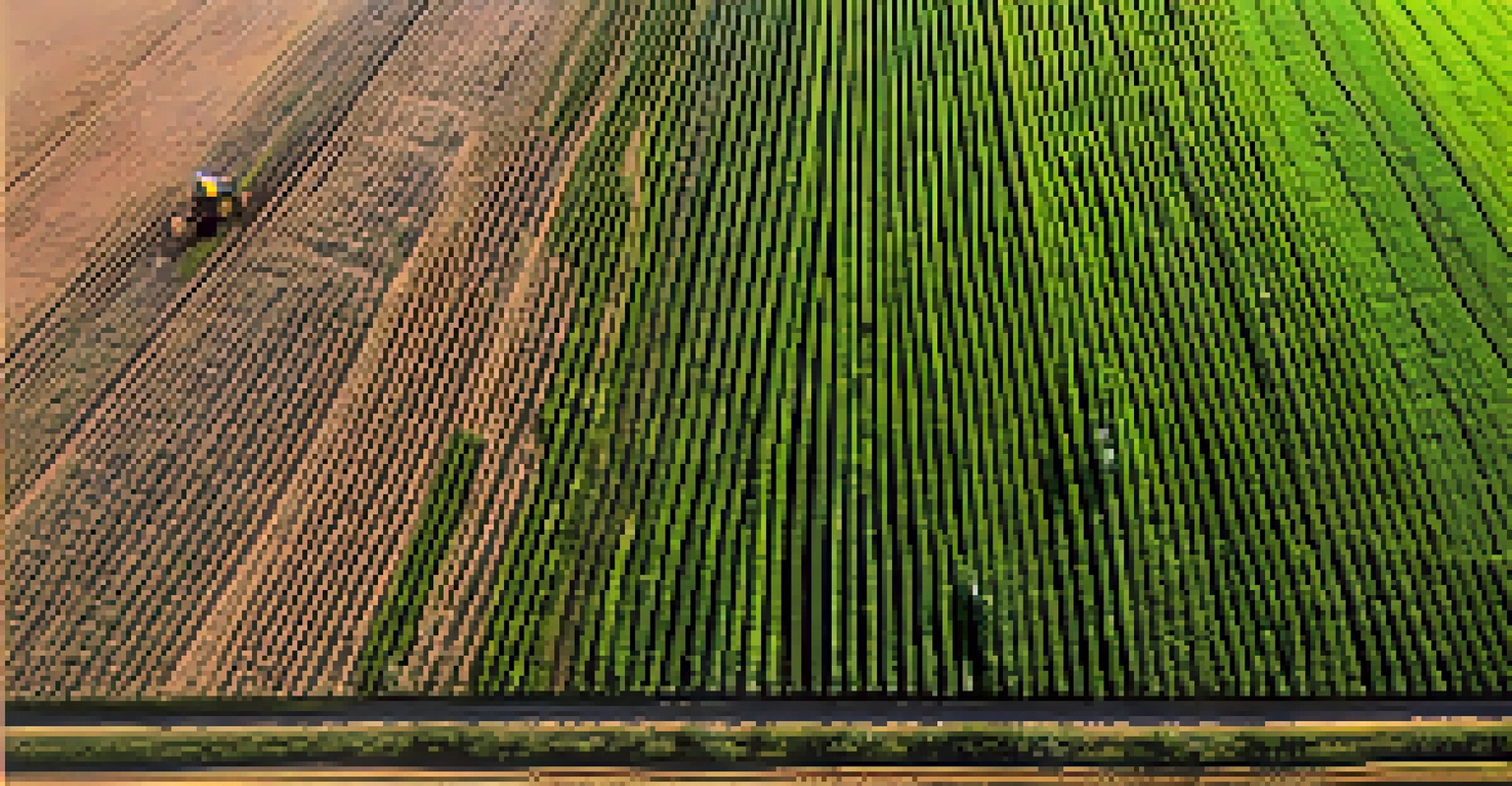Exploring Agricultural Research Institutions in Kansas Today

The Role of Agricultural Research in Kansas' Economy
Agricultural research plays a pivotal role in shaping Kansas' economy, which is primarily driven by farming. With vast fields of wheat and corn, the state relies heavily on innovations that improve crop yields and sustainability. Research institutions in Kansas contribute significantly to these advancements, ensuring local farmers can compete in a global market.
Agriculture is the most healthful, most useful, and most noble employment of man.
For instance, breakthroughs in drought-resistant crops have been essential in a state often challenged by water scarcity. These advancements not only help farmers maintain productivity but also stabilize the local economy. The continuous support for agricultural research is crucial to address the evolving challenges in farming.
Moreover, the collaboration between universities, government agencies, and private sectors enhances the research landscape. This synergy fosters a culture of innovation that keeps Kansas at the forefront of agricultural advancements, creating a ripple effect that benefits everyone from farmers to consumers.
Key Agricultural Research Institutions in Kansas
Kansas is home to several prominent agricultural research institutions, such as Kansas State University (KSU) and the University of Kansas (KU). KSU, in particular, has a renowned agricultural program that offers extensive research opportunities and resources for students and professionals alike. Its research centers focus on various aspects, including crop science, animal health, and sustainable practices.

The Kansas Agricultural Experiment Station (KAES) is another vital player, conducting field trials and experiments that directly impact farming techniques. With multiple locations across the state, KAES ensures that research is relevant to the specific challenges faced by local farmers. This localized approach allows for more tailored solutions that can lead to immediate benefits.
Agricultural Research Drives Economy
Innovations in agricultural research are essential for improving crop yields and sustainability, which in turn supports Kansas' economy.
Additionally, private research institutions and organizations, such as the Kansas Soybean Commission, work collaboratively with universities to contribute to agricultural innovations. These partnerships enhance research funding and resources, ensuring that the state's agricultural sector continues to thrive.
Innovative Research in Crop Science and Technology
Crop science and technology are at the forefront of Kansas' agricultural research initiatives. Researchers are exploring innovative practices that not only boost yields but also promote sustainability. For instance, precision agriculture employs technology like GPS and drones to optimize planting and harvesting, reducing waste while improving efficiency.
The farmer has to be an optimist or he wouldn’t still be a farmer.
One remarkable example is the development of high-yielding, disease-resistant crop varieties. By utilizing advanced genetics and genomics, researchers can create strains that withstand pests and harsh weather conditions. This not only enhances food security but also helps farmers adapt to climate change challenges.
Furthermore, the integration of digital tools in agriculture is revolutionizing how farmers manage their crops. Data analytics and machine learning are becoming essential in predicting outcomes and making informed decisions. This intersection of technology and agriculture signifies a promising future for farming in Kansas.
Sustainable Practices and Environmental Research
Sustainability is a key focus for agricultural research institutions in Kansas, as they seek to minimize the environmental impact of farming. Researchers are investigating practices that conserve water, enhance soil health, and promote biodiversity. These sustainable methods are vital for protecting natural resources while ensuring the longevity of the agricultural sector.
One initiative includes studying cover crops, which help prevent soil erosion and improve nutrient retention. These crops can also provide habitat for beneficial insects, contributing to a balanced ecosystem. By implementing such practices, researchers are helping farmers adopt methods that not only increase productivity but also safeguard the environment.
Focus on Sustainable Practices
Research institutions in Kansas prioritize sustainable farming methods to minimize environmental impact while enhancing productivity.
Moreover, research on integrated pest management (IPM) strategies is gaining traction. IPM combines biological, cultural, and chemical tools to manage pests in a way that reduces risks to human health and the environment. This holistic approach is essential for sustainable farming and is becoming a cornerstone of agricultural research in Kansas.
The Impact of Climate Change on Kansas Agriculture
Climate change poses significant challenges for agriculture in Kansas, necessitating urgent research efforts. Rising temperatures and unpredictable weather patterns affect crop yields and overall farm viability. Research institutions are at the forefront of understanding these impacts and developing adaptive strategies to mitigate risks.
For example, studies on climate-resilient crops aim to identify varieties that can thrive under changing climatic conditions. By focusing on traits like drought tolerance, researchers are providing farmers with options to maintain productivity despite adverse weather. This proactive approach is essential for ensuring food security in a changing climate.
Furthermore, research on carbon sequestration practices aims to help farmers reduce greenhouse gas emissions while improving soil health. Implementing no-till farming and agroforestry can enhance carbon storage in the soil, aligning agricultural practices with environmental sustainability. This dual focus on productivity and environmental responsibility is crucial for the future of Kansas agriculture.
Collaboration Between Researchers and Farmers
The collaboration between researchers and farmers is vital for translating scientific discoveries into practical applications. Research institutions in Kansas actively engage with the farming community to understand their challenges and needs. This partnership ensures that research is relevant and beneficial to real-world farming practices.
Workshops, field days, and extension services provide platforms for knowledge exchange between researchers and farmers. These events allow farmers to learn about the latest findings and technologies while providing researchers with firsthand insights from the field. This reciprocal relationship is essential for fostering innovation in agriculture.
Collaboration Enhances Farming Solutions
Active collaboration between researchers and farmers ensures that agricultural innovations are relevant and directly address real-world challenges.
Moreover, farmer-led research initiatives are gaining popularity, empowering producers to actively participate in the research process. By collaborating on experiments and trials, farmers can directly influence the direction of research, ensuring that it aligns with their practical experiences and challenges.
Future Trends in Agricultural Research in Kansas
Looking ahead, several trends are shaping the future of agricultural research in Kansas. The integration of artificial intelligence and machine learning is poised to revolutionize farming practices, offering data-driven insights for decision-making. This technological evolution can lead to more efficient resource use and enhanced crop management.
Additionally, there is a growing emphasis on regenerative agriculture, which focuses on restoring soil health and promoting biodiversity. Research in this area aims to develop practices that go beyond sustainability, actively improving ecosystems while producing food. This paradigm shift could redefine the agricultural landscape in Kansas.

Lastly, the importance of community engagement in agricultural research is becoming more pronounced. Researchers are increasingly recognizing the value of involving diverse stakeholders, including farmers, consumers, and policymakers, in the research process. This holistic approach can lead to more comprehensive solutions that address the multifaceted challenges facing the agricultural sector.